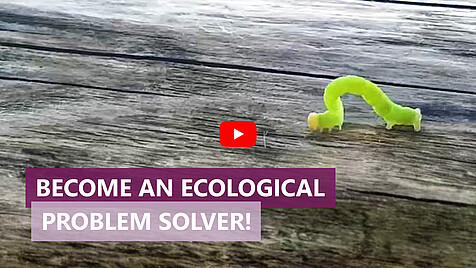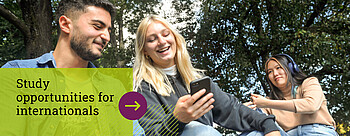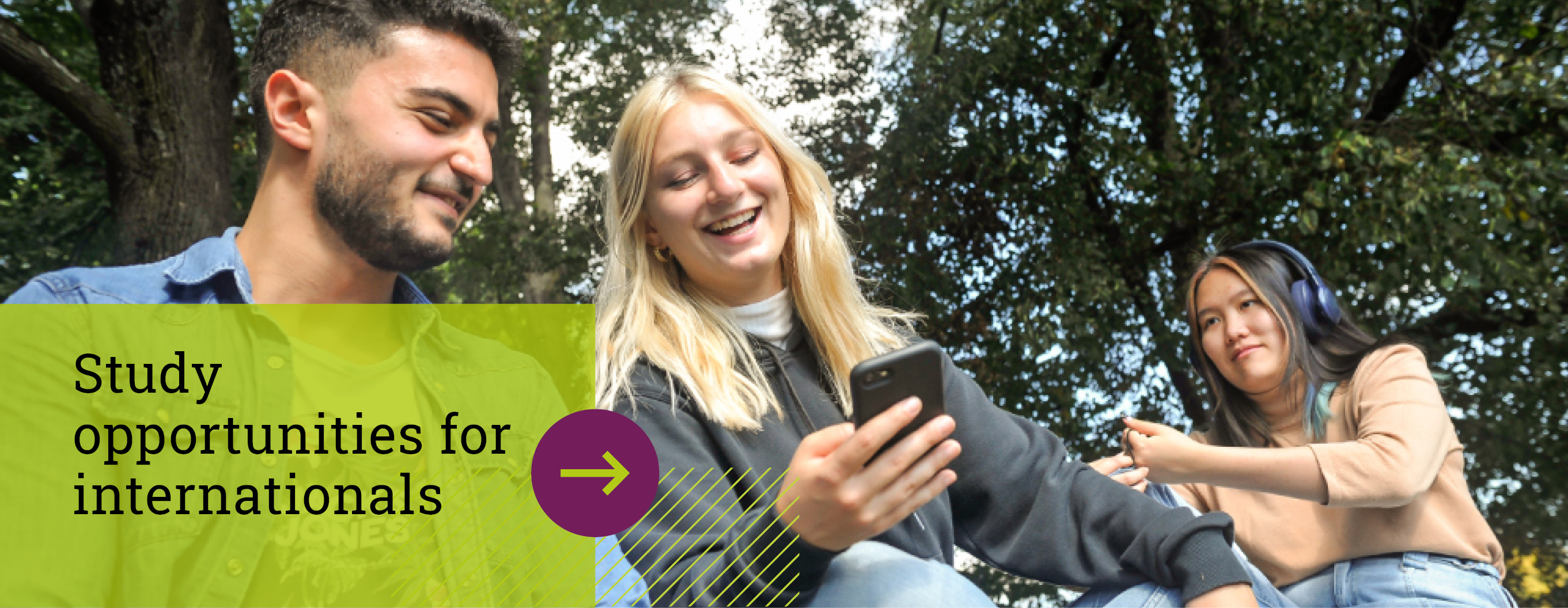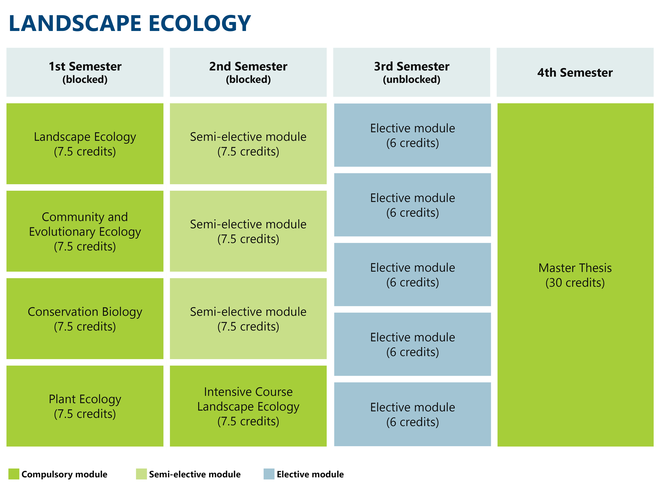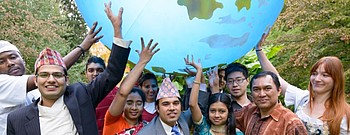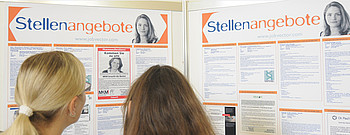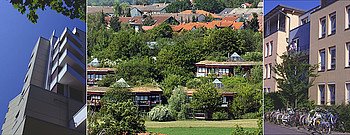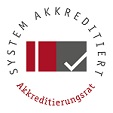Landscape Ecology (Master’s)
Learn to solve ecological problems
Landscape Ecology (Master’s)
Become an ecological problem solver
Global environmental changes pose urgent questions for us. To answer these questions, Landscape Ecology investigates the dynamics of biodiversity and ecosystems. In this English-language degree program, you will learn about the relationships between biodiversity, climate, soils, land use, and nature conservation. The program includes field, laboratory, and computer courses and emphasizes project and team-based work.
- Collaboration in highly topical research projects
- Understanding of the scientific basis of environmental management and nature conservation
- Strategies for solving ecological challenges
- Reasons to choose Hohenheim
| Degree Master of Science (M.Sc.) |
4 semesters 120 credits |
Language English |
University places 20 |
Location Stuttgart |
|||||
In the first academic year
you will acquire in-depth knowledge of ecology, biodiversity dynamics, and nature conservation. Another focus of the program is on how ecological questions can be answered with experiments, field studies, and statistics. You can also take courses in animal ecology, vegetation ecology, agroecology, ecological modeling and forecasting, geographic information systems (GIS), and remote sensing. Project and teamwork together with numerous excursions, outdoor, laboratory, and computer courses are the focus of this degree program.
In the second academic year
you can choose from a wide range of elective modules, for example from the fields of global environmental change, animal, vegetation, agricultural and molecular ecology, soil sciences, agricultural sciences, and transformation sciences. You also have the opportunity to spend a semester at a partner university abroad.
You can complete your Master’s thesis as part of ongoing research projects in Germany, Europe, or other continents.
Degree program objectives
You will acquire the ecological knowledge, quantitative skills, and practical experience to be able to study ecological dynamics in changing environmental conditions. This enables you to assess the effects of environmental changes on biodiversity and ecosystems and to develop concepts for the sustainable use of natural resources.
You will also learn:
- to work in a team in a structure and goal-oriented manner,
- to lead teams, and
- to systematically work though problem-solving approaches,
After graduating, you will be able to enables graduates to answer fundamental and applied research questions in modern ecology creatively and in a scientifically sound manner:
- How can we preserve biodiversity in times of global climate change?
- How can we preserve nature’s contributions to people?
- How can we sustainably use natural resources in a changing environment?
You can find information on the individual modules in the module descriptions.
What you should bring with you
The formal requirements for the Master's program are:
- Above-average Bachelor’s degree in agricultural or environmental sciences, ecology, biology, landscape planning or a related degree program at a university in Germany or abroad or a university of applied sciences with a standard period of study of at least 3 years (180 ECTS in total) (“related degree programs” see Annex 2 of the Admission Regulations)
- If your final grade or grade point average for your degree is not above average, you have to show proof of special aptitude for the degree program (for details see Admission Regulations § 4).
- Demonstrated English proficiency at the level TOEFL 90 (internet based). English proficiency may also be proven by the German university entrance qualification (HZB) if at least four semesters of English were taken in the higher level (Oberstufe) with an average grade of at least 8 points, excluding a separate Abitur examination.
You should have the following interests and knowledge in addition to the formal criteria:
- Basic understanding of ecology
- Good foundation in statistics and computer applications
- Good English skills
- Team spirit and willingness to work in intercultural teams
As a graduate of this program, you are qualified for professions that require you to understand ecology, know how to work with quantitative methods, think analytically, and work independently.
Possible career fields include:
- Research on ecology and biodiversity
- Agencies and organizations dealing with nature and environmental protection at the regional, national, or international levels
- Companies and organizations that work on the sustainable use of resources, geographical analysis, and landscape planning
- Research communication and environmental education
On the alumni page of the Landscape Ecology degree program, you can see some examples of our graduates’ careers.
In addition, the Master's program qualifies students to embark on a doctoral project. Most universities as well as most graduate schools expect above-average performance in the Master's program for this.
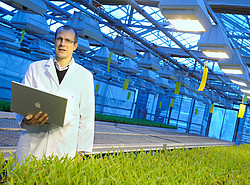
Good reasons to study at the Faculty of Agricultural Sciences in Hohenheim
First Place not Once but Three Times: The current Global Universities Ranking from U.S. News & World Report, the renowned NTU ranking, QS World University Ranking, and dathe Center of World University Ranking put University of Hohenheim’s agricultural research in 1st place in Germany.
In the agricultural university ranking from top agrar, the agricultural students at the University of Hohenheim give the grades 1.5 to 2.0. According to the ranking 2016, 88% of the students surveyed would recommend the University of Hohenheim for agricultural studies.
The University of Hohenheim puts great importance on quality teaching, which is demonstrated by several award-winning reform projects.
These projects include for example mobile teaching (German e-learning innovation and young scientists award (d-elina) in the category “Campus” at the BITKOM) or the ethics module, developed by the student group FRESH and awarded by the UN.

Students acquire the knowledge necessary for understanding ecological dynamics and managing these dynamics under global change. They learn how to address fundamental and applied ecological questions in a scientifically sound and creative way.

The vision of the Faculty of Agricultural Sciences is a global agricultural system which is productive, environmentally-friendly and socially-minded, and which is in harmony with society’s demand for a multi-purpose orientation.
Agricultural research at the University of Hohenheim is focused on four areas:
- Food for all: Security of global food supply
- Hazard prevention: Climate change and scarcity of resources
- Beyond fossil fuels: Bioenergy and bio-based value-creation networks
- Diversity instead of monoculture: Genome Diversity in Agriculture
There are no easy answers to these kinds of questions. That is why agricultural researchers at the University of Hohenheim work across disciplinary boundaries, collaborating with colleagues in the natural sciences, business administration and economics, and the social sciences, for instance in bioeconomics, a field of research and teaching that will become even more important in the future. That collaboration also has an impact on teaching.
Number 1 in internationalization: In the current EU ranking U-Multirank, the University of Hohenheim has a top spot in internationalization.
The basis for this placing is the decades-long, global commitment of the Agricultural Sciences. Especially our tropics research with 10 professorships has made the University known around the world.
International opportunities for students:
- 80 partner institutions worldwide (40 of which are in the Erasmus+ program)
- Member of the Euroleague for Life Sciences - the network for Europe’s best
- scholarship programs for travel, research, and exchange
- Worldwide alumni network
- Studies according to international standards for excellence and international competitiveness of graduates
Professors of the Faculty of Agricultural Sciences are in high demand.
The top experts include:
 | Chair of the scientific advisory council Prof. Dr. Martina Brockmeier The German Council of Science and Humanities is considered the highest-ranking advisory committee on topics of science in Germany. Its scientific members are appointed by the Federal President. |
 | In the Bioeconomy Council Prof. Dr. Regina Birner The Bioeconomy Council is an independent advisory committee for the German federal government. The goal: to establish a cross-sectoral and bio-based economy in Germany that uses as few fossil raw materials as possible. |
Further members in important commissions and expert lists
- Prof. Dr. Iris Lewandowski and Prof. Dr. Joachim Müller are members of the BMBF scientific advisory council "Agricultural Systems of the Future”
- Prof. Dr. Enno Bahrs is member of the BMEL scientific advisory council for biodiversity and genetic resources
- Expert lists on various agricultural topics

Scholarship and awards for studies, final theses, travel, and attending conferences: Thanks to many supporters, the University of Hohenheim has an unusually extensive scholarship culture.
Around 100,000 Euros is the total amount of all scholarships and awards that are presented each year at the Dies academicus.
More than 700 hectares of test area: Among German universities, the University of Hohenheim owns the largest amount of property. For students, this means a lot of room for their own experiments, research, and a great deal of hands-on experience.
Also directly on campus: State institutes for transferring science into practice, the Hohenheim Gardens, and the German Agricultural Museum.

The future lack of experts and managers in the area of agriculture / nutrition / horticulture means students of agricultural will have good career prospects. This was shown by a 2015 study by the Bundesverband Agrar Ernährung Umwelt (VDL).

The University of Hohenheim is a university with a long tradition. You will experience a truly unique university atmosphere enriched by the Baroque palace, the historic gardens and parks, and modern architecture: In 2009, the University of Hohenheim was declared the most beautiful campus university in the state.
In 2017, Hohenheim's President Stephan Dabbert was chosen by the German Association of University Professors and Lecturers (DHV) as the most popular president in Baden-Württemberg for the third year in a row. He was ranked second in all of Germany.
This jewel is located south of the state capital Stuttgart. Because it is close to Stuttgart, you have all the opportunities available in a big city. The University of Hohenheim is only a few minutes away from the airport, the Stuttgart Trade Fair Centre, and the autobahn and is easily reached with public transportation.
 | Unique party atmosphere: The historical Thomas-Müntzer-Scheuer, an old barn with a new purpose, is the party center of Hohenheim. |
 | The University ball in the pompous palace rooms is the social event of the year. |
Because of the freedom you have in designing your last year of studies, credits earned during a semester abroad can be easily recognized as elective modules. This means that spending time abroad will not typically extend the amount of time you need to complete the program.
You can also complete your Master's thesis abroad.
The Faculty of Agricultural Sciences engages in research and teaching cooperation with 80 partner institutions worldwide, 40 of which are part of the ERASMUS program.
The University of Hohenheim’s Office of International Affairs offers information and advising on stays abroad and how to finance them through scholarships.
Explore ecological issues right from the start
Gain practical experience
From the first semester onwards, you will work on your own research projects under supervision. Many modules of this degree program include practical components in the field and in the laboratory. You can integrate an internship, e.g., in a consulting firm, an NGO, or a government agency, into your degree program using the portfolio module as an elective module, or even use it to collect data for your Master's thesis. The lecturers in the program are happy to help you arrange internships. A suitable time for this is, for example, in or after the third semester, before you start your Master's thesis.
Expanding competences
You will find additional further education opportunities on campus in the form of the F.I.T continuing education courses, the “Artificial Intelligence and Data Science in Hohenheim” (AIDAHO) certificate, or the start-up support in the “Innovation Greenhouse”.
Learning from practice
The degree program offers you numerous opportunities for practical learning. Lectures by experts from outside the university, contact with alumni from your degree program, inspiring excursions, and applied examples in your studies give you a direct insight into professional practice and promote your ability to actively apply the knowledge you have learned.
Strengthening language and intercultural skills
Would you like to acquire further language skills? For this purpose, the Language Center at the University of Hohenheim offers various semester and intensive courses that you can take individually during your studies. You can even acquire the UniCert III C1 certificate as part of an elective module. During your studies, you will also acquire intercultural skills naturally by interacting with your fellow students from all over the world.
Researching during your studies
During your studies, you have a wide range of opportunities to carry out your own research projects, work in leading research groups, and gain valuable insights into research practice. By actively participating in research projects, student research projects, and specialized research modules, you become part of the scientific process and acquire qualifications for independent scientific work. You can find research topics at: https://agrar.uni-hohenheim.de/en/research0
As a graduate of this program, you are qualified for professions that require you to understand ecology, know how to work with quantitative methods, think analytically, and work independently.
Possible career fields include:
- Research on ecology and biodiversity
- Agencies and organizations dealing with nature and environmental protection at the regional, national, or international levels
- Companies and organizations that work on the sustainable use of resources, geographical analysis, and landscape planning
- Research communication and environmental education
On the alumni page of the Landscape Ecology degree program, you can see some examples of our graduates’ careers.
In addition, the Master's program qualifies students to embark on a doctoral project. Most universities as well as most graduate schools expect above-average performance in the Master's program for this.
| Start of the application period |
|---|
| Non-EU citizens: Mid-November of the year before the program starts German, EU citizens: Mid-April |
| Application deadlines | |
|---|---|
| 1st subject-related semester | Only possible for the winter semester! German, EU citizens: 15 July Non-EU citizens: 15 March |
Higher subject-related semesters | For the winter semester: All applicants: 15 January |
| Requirements | |
|---|---|
| Admission requirements |
|
| Selection procedure | |
|---|---|
| Selection criteria |
Additional points are given for vocational training, an intern examination, or proven two years of professional experience related to the degree program. For details, see the Admission Regulations (german | english). |

